Zheyu Shen
FedMOA: Federated GRPO for Personalized Reasoning LLMs under Heterogeneous Rewards
Jan 31, 2026Abstract:Group Relative Policy Optimization (GRPO) has recently emerged as an effective approach for improving the reasoning capabilities of large language models through online multi-objective reinforcement learning. While personalization on private data is increasingly vital, traditional Reinforcement Learning (RL) alignment is often memory-prohibitive for on-device federated learning due to the overhead of maintaining a separate critic network. GRPO's critic-free architecture enables feasible on-device training, yet transitioning to a federated setting introduces systemic challenges: heterogeneous reward definitions, imbalanced multi-objective optimization, and high training costs. We propose FedMOA, a federated GRPO framework for multi-objective alignment under heterogeneous rewards. FedMOA stabilizes local training through an online adaptive weighting mechanism via hypergradient descent, which prioritizes primary reasoning as auxiliary objectives saturate. On the server side, it utilizes a task- and accuracy-aware aggregation strategy to prioritize high-quality updates. Experiments on mathematical reasoning and code generation benchmarks demonstrate that FedMOA consistently outperforms federated averaging, achieving accuracy gains of up to 2.2% while improving global performance, personalization, and multi-objective balance.
EdgeLoRA: An Efficient Multi-Tenant LLM Serving System on Edge Devices
Jul 02, 2025Abstract:Large Language Models (LLMs) have gained significant attention due to their versatility across a wide array of applications. Fine-tuning LLMs with parameter-efficient adapters, such as Low-Rank Adaptation (LoRA), enables these models to efficiently adapt to downstream tasks without extensive retraining. Deploying fine-tuned LLMs on multi-tenant edge devices offers substantial benefits, such as reduced latency, enhanced privacy, and personalized responses. However, serving LLMs efficiently on resource-constrained edge devices presents critical challenges, including the complexity of adapter selection for different tasks and memory overhead from frequent adapter swapping. Moreover, given the multiple requests in multi-tenant settings, processing requests sequentially results in underutilization of computational resources and increased latency. This paper introduces EdgeLoRA, an efficient system for serving LLMs on edge devices in multi-tenant environments. EdgeLoRA incorporates three key innovations: (1) an adaptive adapter selection mechanism to streamline the adapter configuration process; (2) heterogeneous memory management, leveraging intelligent adapter caching and pooling to mitigate memory operation overhead; and (3) batch LoRA inference, enabling efficient batch processing to significantly reduce computational latency. Comprehensive evaluations using the Llama3.1-8B model demonstrate that EdgeLoRA significantly outperforms the status quo (i.e., llama.cpp) in terms of both latency and throughput. The results demonstrate that EdgeLoRA can achieve up to a 4 times boost in throughput. Even more impressively, it can serve several orders of magnitude more adapters simultaneously. These results highlight EdgeLoRA's potential to transform edge deployment of LLMs in multi-tenant scenarios, offering a scalable and efficient solution for resource-constrained environments.
Invisible Tokens, Visible Bills: The Urgent Need to Audit Hidden Operations in Opaque LLM Services
May 24, 2025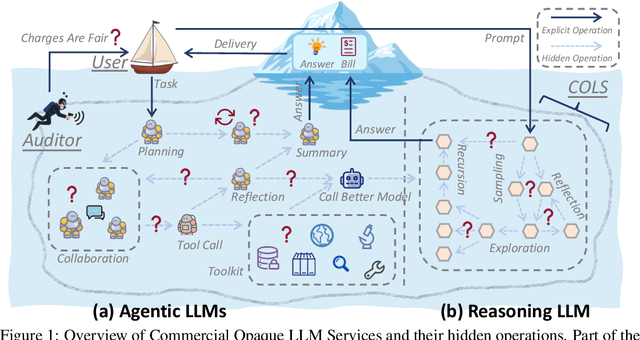
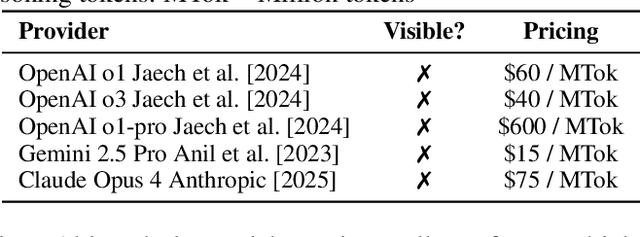
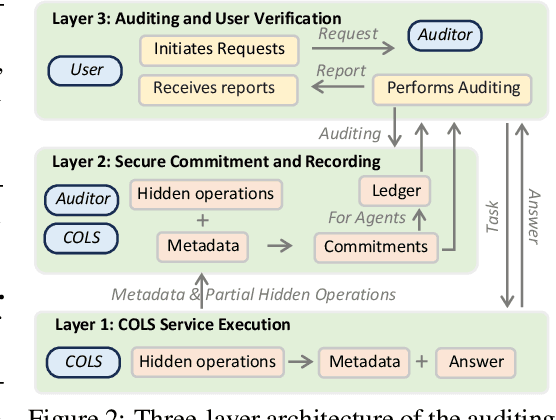

Abstract:Modern large language model (LLM) services increasingly rely on complex, often abstract operations, such as multi-step reasoning and multi-agent collaboration, to generate high-quality outputs. While users are billed based on token consumption and API usage, these internal steps are typically not visible. We refer to such systems as Commercial Opaque LLM Services (COLS). This position paper highlights emerging accountability challenges in COLS: users are billed for operations they cannot observe, verify, or contest. We formalize two key risks: \textit{quantity inflation}, where token and call counts may be artificially inflated, and \textit{quality downgrade}, where providers might quietly substitute lower-cost models or tools. Addressing these risks requires a diverse set of auditing strategies, including commitment-based, predictive, behavioral, and signature-based methods. We further explore the potential of complementary mechanisms such as watermarking and trusted execution environments to enhance verifiability without compromising provider confidentiality. We also propose a modular three-layer auditing framework for COLS and users that enables trustworthy verification across execution, secure logging, and user-facing auditability without exposing proprietary internals. Our aim is to encourage further research and policy development toward transparency, auditability, and accountability in commercial LLM services.
CoIn: Counting the Invisible Reasoning Tokens in Commercial Opaque LLM APIs
May 19, 2025Abstract:As post-training techniques evolve, large language models (LLMs) are increasingly augmented with structured multi-step reasoning abilities, often optimized through reinforcement learning. These reasoning-enhanced models outperform standard LLMs on complex tasks and now underpin many commercial LLM APIs. However, to protect proprietary behavior and reduce verbosity, providers typically conceal the reasoning traces while returning only the final answer. This opacity introduces a critical transparency gap: users are billed for invisible reasoning tokens, which often account for the majority of the cost, yet have no means to verify their authenticity. This opens the door to token count inflation, where providers may overreport token usage or inject synthetic, low-effort tokens to inflate charges. To address this issue, we propose CoIn, a verification framework that audits both the quantity and semantic validity of hidden tokens. CoIn constructs a verifiable hash tree from token embedding fingerprints to check token counts, and uses embedding-based relevance matching to detect fabricated reasoning content. Experiments demonstrate that CoIn, when deployed as a trusted third-party auditor, can effectively detect token count inflation with a success rate reaching up to 94.7%, showing the strong ability to restore billing transparency in opaque LLM services. The dataset and code are available at https://github.com/CASE-Lab-UMD/LLM-Auditing-CoIn.
PHYBench: Holistic Evaluation of Physical Perception and Reasoning in Large Language Models
Apr 22, 2025



Abstract:We introduce PHYBench, a novel, high-quality benchmark designed for evaluating reasoning capabilities of large language models (LLMs) in physical contexts. PHYBench consists of 500 meticulously curated physics problems based on real-world physical scenarios, designed to assess the ability of models to understand and reason about realistic physical processes. Covering mechanics, electromagnetism, thermodynamics, optics, modern physics, and advanced physics, the benchmark spans difficulty levels from high school exercises to undergraduate problems and Physics Olympiad challenges. Additionally, we propose the Expression Edit Distance (EED) Score, a novel evaluation metric based on the edit distance between mathematical expressions, which effectively captures differences in model reasoning processes and results beyond traditional binary scoring methods. We evaluate various LLMs on PHYBench and compare their performance with human experts. Our results reveal that even state-of-the-art reasoning models significantly lag behind human experts, highlighting their limitations and the need for improvement in complex physical reasoning scenarios. Our benchmark results and dataset are publicly available at https://phybench-official.github.io/phybench-demo/.
SymRTLO: Enhancing RTL Code Optimization with LLMs and Neuron-Inspired Symbolic Reasoning
Apr 14, 2025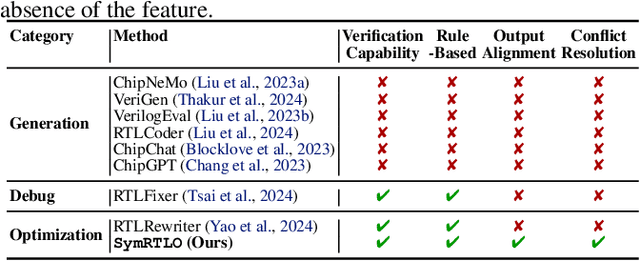


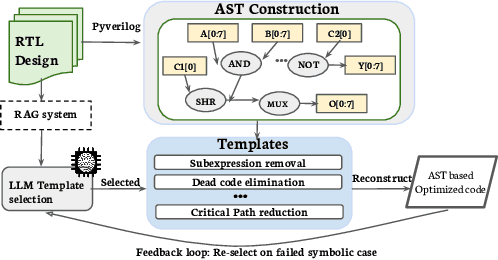
Abstract:Optimizing Register Transfer Level (RTL) code is crucial for improving the power, performance, and area (PPA) of digital circuits in the early stages of synthesis. Manual rewriting, guided by synthesis feedback, can yield high-quality results but is time-consuming and error-prone. Most existing compiler-based approaches have difficulty handling complex design constraints. Large Language Model (LLM)-based methods have emerged as a promising alternative to address these challenges. However, LLM-based approaches often face difficulties in ensuring alignment between the generated code and the provided prompts. This paper presents SymRTLO, a novel neuron-symbolic RTL optimization framework that seamlessly integrates LLM-based code rewriting with symbolic reasoning techniques. Our method incorporates a retrieval-augmented generation (RAG) system of optimization rules and Abstract Syntax Tree (AST)-based templates, enabling LLM-based rewriting that maintains syntactic correctness while minimizing undesired circuit behaviors. A symbolic module is proposed for analyzing and optimizing finite state machine (FSM) logic, allowing fine-grained state merging and partial specification handling beyond the scope of pattern-based compilers. Furthermore, a fast verification pipeline, combining formal equivalence checks with test-driven validation, further reduces the complexity of verification. Experiments on the RTL-Rewriter benchmark with Synopsys Design Compiler and Yosys show that SymRTLO improves power, performance, and area (PPA) by up to 43.9%, 62.5%, and 51.1%, respectively, compared to the state-of-the-art methods.
Prada: Black-Box LLM Adaptation with Private Data on Resource-Constrained Devices
Mar 19, 2025Abstract:In recent years, Large Language Models (LLMs) have demonstrated remarkable abilities in various natural language processing tasks. However, adapting these models to specialized domains using private datasets stored on resource-constrained edge devices, such as smartphones and personal computers, remains challenging due to significant privacy concerns and limited computational resources. Existing model adaptation methods either compromise data privacy by requiring data transmission or jeopardize model privacy by exposing proprietary LLM parameters. To address these challenges, we propose Prada, a novel privacy-preserving and efficient black-box LLM adaptation system using private on-device datasets. Prada employs a lightweight proxy model fine-tuned with Low-Rank Adaptation (LoRA) locally on user devices. During inference, Prada leverages the logits offset, i.e., difference in outputs between the base and adapted proxy models, to iteratively refine outputs from a remote black-box LLM. This offset-based adaptation approach preserves both data privacy and model privacy, as there is no need to share sensitive data or proprietary model parameters. Furthermore, we incorporate speculative decoding to further speed up the inference process of Prada, making the system practically deployable on bandwidth-constrained edge devices, enabling a more practical deployment of Prada. Extensive experiments on various downstream tasks demonstrate that Prada achieves performance comparable to centralized fine-tuning methods while significantly reducing computational overhead by up to 60% and communication costs by up to 80%.
Fair Diagnosis: Leveraging Causal Modeling to Mitigate Medical Bias
Dec 06, 2024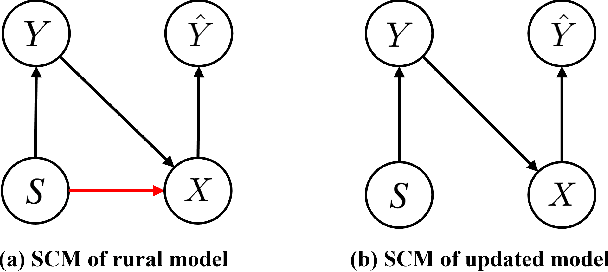
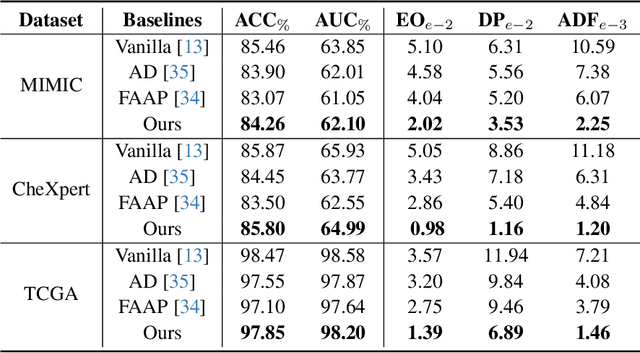
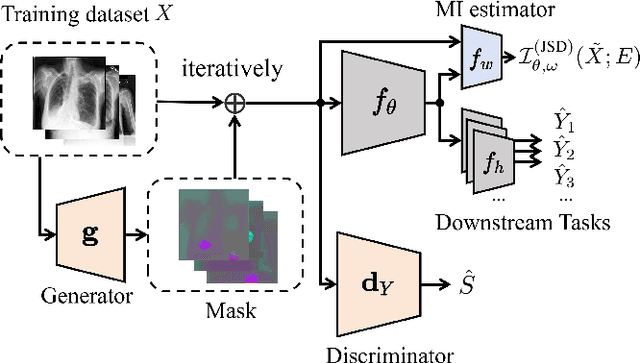
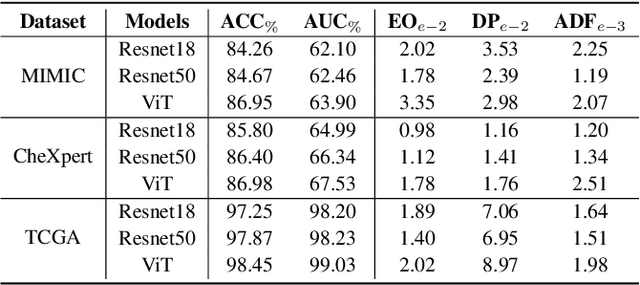
Abstract:In medical image analysis, model predictions can be affected by sensitive attributes, such as race and gender, leading to fairness concerns and potential biases in diagnostic outcomes. To mitigate this, we present a causal modeling framework, which aims to reduce the impact of sensitive attributes on diagnostic predictions. Our approach introduces a novel fairness criterion, \textbf{Diagnosis Fairness}, and a unique fairness metric, leveraging path-specific fairness to control the influence of demographic attributes, ensuring that predictions are primarily informed by clinically relevant features rather than sensitive attributes. By incorporating adversarial perturbation masks, our framework directs the model to focus on critical image regions, suppressing bias-inducing information. Experimental results across multiple datasets demonstrate that our framework effectively reduces bias directly associated with sensitive attributes while preserving diagnostic accuracy. Our findings suggest that causal modeling can enhance both fairness and interpretability in AI-powered clinical decision support systems.
One Communication Round is All It Needs for Federated Fine-Tuning Foundation Models
Dec 05, 2024Abstract:The recent advancement of large foundation models (FMs) has increased the demand for fine-tuning these models on large-scale and cross-domain datasets. To address this, federated fine-tuning has emerged as a solution, allowing models to be fine-tuned on distributed datasets across multiple devices while ensuring data privacy. However, the substantial parameter size of FMs and the multi-round communication required by traditional federated fine-tuning algorithms result in prohibitively high communication costs, challenging the practicality of federated fine-tuning. In this paper, we are the first to reveal, both theoretically and empirically, that the traditional multi-round aggregation algorithms may not be necessary for federated fine-tuning large FMs. Our experiments reveal that a single round of communication (i.e., one-shot federated fine-tuning) yields a global model performance comparable to that achieved through multiple rounds of communication. Through rigorous mathematical and empirical analyses, we demonstrate that large FMs, due to their extensive parameter sizes and pre-training on general tasks, achieve significantly lower training loss in one-shot federated fine-tuning compared to smaller models. Our extensive experiments show that one-shot federated fine-tuning not only reduces communication costs but also enables asynchronous aggregation, enhances privacy, and maintains performance consistency with multi-round federated fine-tuning for models larger than 1 billion parameters, on text generation and text-to-image generation tasks. Our findings have the potential to revolutionize federated fine-tuning in practice, enhancing efficiency, reducing costs, and expanding accessibility for large-scale models. This breakthrough paves the way for broader adoption and application of federated fine-tuning across various domains.
FLoRA: Federated Fine-Tuning Large Language Models with Heterogeneous Low-Rank Adaptations
Sep 09, 2024



Abstract:The rapid development of Large Language Models (LLMs) has been pivotal in advancing AI, with pre-trained LLMs being adaptable to diverse downstream tasks through fine-tuning. Federated learning (FL) further enhances fine-tuning in a privacy-aware manner by utilizing clients' local data through in-situ computation, eliminating the need for data movement. However, fine-tuning LLMs, given their massive scale of parameters, poses challenges for clients with constrained and heterogeneous resources in FL. Previous methods employed low-rank adaptation (LoRA) for efficient federated fine-tuning but utilized traditional FL aggregation strategies on LoRA adapters. These approaches led to mathematically inaccurate aggregation noise, reducing fine-tuning effectiveness and failing to address heterogeneous LoRAs. In this work, we first highlight the mathematical incorrectness of LoRA aggregation in existing federated fine-tuning methods. We introduce a new approach called FLORA that enables federated fine-tuning on heterogeneous LoRA adapters across clients through a novel stacking-based aggregation method. Our approach is noise-free and seamlessly supports heterogeneous LoRA adapters. Extensive experiments demonstrate FLORA' s superior performance in both homogeneous and heterogeneous settings, surpassing state-of-the-art methods. We envision this work as a milestone for efficient, privacy-preserving, and accurate federated fine-tuning of LLMs. Our code is available at https://github.com/ATP-1010/FederatedLLM.
 Add to Chrome
Add to Chrome Add to Firefox
Add to Firefox Add to Edge
Add to Edge